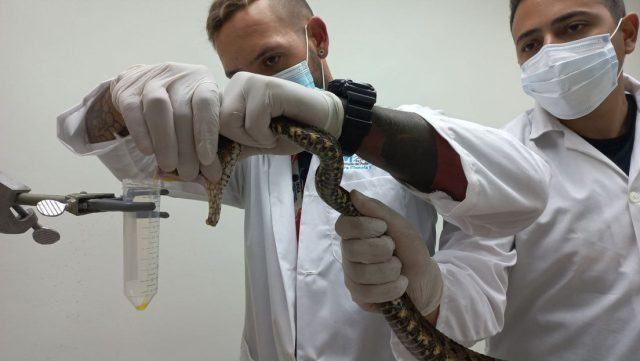In Venezuela, antivenoms are currently being developed to counteract the effects of snake and scorpion bites. These antidotes are made with IgY technology, based on chicken antibodies, and so far, have been tested on 40 people with no adverse reactions reported.
José Contreras, a researcher and expert in snake management at the Institute for Advanced Studies (IDEA), tells RT about the project being carried out by Venezuelan researchers from that institution and from the Francisco de Miranda Experimental University, in the central-western state of Falcón. The purpose of the project is the production of alternative antidotes so as to reduce adverse effects in patients, lower costs and increase their availability in remote parts of the country, where there is a higher frequency of snakebite accidents.
Contreras says that he fell in love with snakes at the age of 11, when he arrived at the Institute of Tropical Medicine of the Central University of Venezuela (UCV). «I entered as a volunteer washing fish tanks in the serpentarium and stayed with them until I was 21 years old». After that experience he went to IDEA, where he is currently working.
His specialization in the handling of snakes has been achieved step by step, in a self-taught way. In Venezuela, there is no professionalization on the subject in the academic area, so his process has been one of formal self-training to meet the standards of the research institute to which he belongs.
From his office, which has the Sartenejas Valley as its background, in the Baruta municipality of the Miranda state, where the IDEA is located, he says that he has never suffered an accident in the 13 years he has been extracting the poison and «milking» the snakes. He states that the key is «respect and observation of the behavior of animals that play a role in maintaining environmental balance».
What is a snake antivenom?
It is a specific drug that is used from the poison with which it was created. In Venezuela, the best known is the one produced by the Biotechnology Center of the Faculty of Pharmacy of the UCV, which is polyvalent, that is, it neutralizes the effects of the bites of various species of snakes.
It is applied to the bite of specimens of the genus Crotalus (rattlesnake) and Bothrops (mapanare, velvet, tiger butterfly), which are the ones that cause the most ‘accidents’ in Venezuela. It is known that between 5,000 and 7,000 events of this type take place annually in the South American country.
What happens after a snake bite?
Rattlesnake venom is highly neurotoxic, attacking the central nervous system, causing paralysis and respiratory arrest. In the case of the mapanares, the toxic substance is proteolytic, hemolytic and coagulant, it breaks down tissues, destroys the blood and generates necrosis.
An important aspect – explains Contreras – is that the poisons, due to a natural and evolutionary condition, are modified in the natural environment of the snakes, so it is necessary that the collection, for research in the serpentariums, be constantly renewed.Does Venezuela manufacture all the antivenoms?
The country does not produce an antidote for the coral or for the pineapple cuaima (Lachesis muta) because its geographical distribution is limited to very remote areas and the number of events does not warrant the production of the antivenom.
In the face of this situation, the specialist explains that the scientific-technological area of the Ministry of Science and Technology and the IDEA consider that «the ‘meeting capacity’ that may exist between people and this type of animal should not be underestimated», for which they work in the development of new technologies, much cheaper than the traditional ones, to produce antivenoms «equal or much more efficient and that can encompass a larger snake monopoly».
Currently, at the IDEA, a serpentarium is being built with the adaptations of a laboratory for the production of poison, which would not only be used to make the antidote, but also in research on its pharmacological potential.
So far, the researchers have successfully neutralized ‘fractions’ of scorpion venom that will be used to start the production of the antidote.
Regionalize snake venoms
The also graduate in Education explains that the first link of the proposal is made up of snakes and the poison they produce, because thanks to them (the snakes) they can obtain the drug to neutralize it. «The idea of the success of this project is to try to regionalize antivenoms, so that there will be multiple producers and not a single producer», as is currently the case.
For this – he continues – the State relies on the universities. “If we can get four or five (universities) to produce antidotes for certain regions, costs are lowered and it is guaranteed that the largest amount of the poison map in Venezuela is covered”.Does the antivenom used have limitations?
Polyvalent antivenom serum is produced in Venezuela. The venom is taken from snakes and inoculated into horses, which produce antibodies to neutralize it. For this process, the blood is extracted and the plasma is used, reports a publication of the Institute of Tropical Medicine.
Among the limitations for the conservation of this serum is the impossibility of maintaining the cold chain to preserve it. «Generally, in the most remote places, where more accidents happen, sometimes they don’t have electricity, the power goes out for several hours and they don’t have refrigerators», he explains.
Although the researcher highlights the positive characteristics of the antivenom produced by the UCV, which has even shown efficacy when the cold chain is broken, he explains that due to the bioethical regulations for transfer of drugs it cannot be taken to some places because refrigerated vehicles are needed and they dont have them.
How is the antivenom that is in development?
To do this, IgY technology is used, related to the production and use of avian antibodies (egg immunoglobulin or IgY).
Regarding the advantages, the environmental educator affirms that the product is presented freeze-dried or dehydrated, in powder form and does not need refrigeration. In addition, it has the possibility of causing fewer adverse effects when it is administered.
Similarly, as the material is removed from the egg it can be produced in more quantities; Chicken breeding is cheaper than horse breeding and the bioethical aspect is respected, since the birds do not suffer from bloodletting to extract the plasma, as it happens with horses.Do chickens suffer?
Chickens, like horses, are also inoculated with doses of the poison, however, the antibodies are extracted from the egg, which can then be consumed without problems, and the bird can continue its life normally.Where is this drug produced?
A group of specialists leads the project at the Francisco de Miranda Experimental University. There, in the Technological Research Development Center, there is a range of laboratories and qualified personnel who extract the immunoglobulins, prepare the drug and package it.
The chicken coops and the serpentarium are also in the university.How many people has the antidote been applied to?
The antivenom fron the state of Falcón has already been used in 40 people who responded positively and, even up to six months after administration, had no adverse reactions to immunoglobulin.
It is currently in an evaluation phase with the support of the Ministry of Science and Technology and the National Institute of Hygiene, which is the regulatory body in pharmaceutical matters, and the procedures and tests for its certification are being carried out.Is there a record of accidents with snakes?
Contreras affirms that work is currently being done to build an information management system in public hospitals, which has technological tools to facilitate the work of registering people poisoned by snakes or scorpions.
For the momen, they do not have epidemiological bulletins that collect the incidence of accidents in each of the states. «We know the number is high because the number of snakes is high, just like in neighboring countries, which are among the most megadiverse on the planet».



